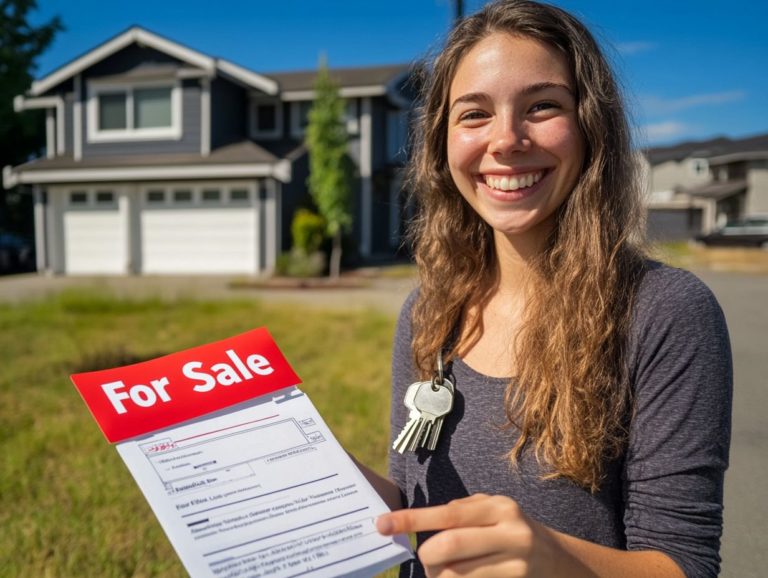What Are the Most Common Seller Mistakes?
Selling is an art. Even the best sellers can make mistakes. This article explores typical pitfalls that sellers face, from pricing errors to marketing miscalculations.
It emphasizes the importance of setting the right price for your products, creating effective marketing plans, and delivering outstanding customer service.
Additionally, it covers critical aspects of inventory management and sound financial practices.
Understanding these common mistakes helps you improve your sales and navigate the selling landscape with greater finesse, positioning your business for lasting success.
Contents
- Key Takeaways:
- Overview of Seller Mistakes
- Pricing Mistakes
- Marketing and Advertising Mistakes
- Customer Service Mistakes
- Inventory Management Mistakes
- Financial Mistakes
- Frequently Asked Questions
- What are the most common seller mistakes when selling a home?
- What is the biggest mistake sellers make when pricing their home?
- Why is it important to make necessary repairs and updates before selling a home?
- What is the role of home staging in the selling process?
- What are the consequences of not hiring a reliable real estate agent?
- What can sellers do to avoid common mistakes when selling their home?
Key Takeaways:

Properly pricing your product is crucial for success. Consider competition, demand, and production costs.
Effective marketing can greatly impact your success. Use both traditional and digital methods to reach your audience.
Providing exceptional customer service is key to retaining customers and building a loyal base. Go above and beyond to ensure a positive experience.
Overview of Seller Mistakes
In the competitive real estate market, understanding common missteps made by home sellers can profoundly influence the success of your sale. Many homeowners overlook key factors, such as mispricing, ignoring essential repairs, or not accounting for moving expenses and closing costs elements that can deter potential buyers.
Collaborating with a skilled real estate agent who understands the market can significantly reduce these miscalculations, leading to a smoother selling experience. Familiarizing yourself with these common pitfalls helps you navigate the intricacies of selling your home effectively.
Understanding Common Mistakes Made by Sellers
Home sellers often make critical missteps that can impede their efforts to sell property effectively. Overlooking essential home inspections and skimping on quality staging and striking listing photos are among the most prevalent pitfalls.
These oversights can drastically reduce your property’s appeal. When potential buyers encounter issues in a neglected inspection report, their trust in your property diminishes, often resulting in lower offers or outright rejection.
Poor staging can leave rooms feeling lifeless and uninviting, failing to showcase the home s potential. Low-quality listing photos can also deter buyers; first impressions are crucial in attracting viewings.
By addressing these common pitfalls, you can enhance your home s presentation, significantly increasing the chances of a successful sale at a price that meets your expectations.
Pricing Mistakes
Setting the right price for your home is vital in attracting potential buyers. Mispricing can lead to low offers or, worse, a stagnant listing that fails to generate interest in today’s competitive market.
To set a price that reflects your home s value, conducting a thorough market analysis is essential. Collaborating with an experienced real estate agent provides invaluable insights into effective pricing strategies, helping you position your home optimally while avoiding traps of overpricing or underpricing.
Setting the Right Price for Your Product or Service
When selling your home, the right price is crucial. It should reflect both your home’s true value and current market trends; otherwise, you risk mispricing it, leading to unwanted consequences like higher commissions and closing costs.
To determine the ideal listing price, start by analyzing comparable sales in your neighborhood. This will show you what similar homes have recently sold for.
Consider current market demand as well. In a seller s market, you may have leverage to set a higher price. In a buyer s market, a more competitive strategy may be necessary to attract interest.
Don’t forget to factor in potential selling costs such as renovations, staging, and closing costs to ensure your final price aligns with your financial goals and market realities.
By approaching pricing strategically, you can attract buyers while maximizing your returns.
Marketing and Advertising Mistakes

An effective marketing strategy is vital for selling your home. Many sellers stumble into mistakes in advertising.
For instance, using poor-quality listing photos or neglecting to promote their property during showings can drastically reduce buyer interest. By avoiding these pitfalls and enhancing your marketing approach, you can significantly increase your chances of attracting the right buyers.
Effective Strategies for Promoting Your Business
In real estate, effective marketing and advertising strategies are crucial for promoting your home. Leveraging the expertise of a dedicated real estate agent can greatly improve your visibility in a competitive market.
Your journey starts with high-quality listing photos. Stunning visuals can capture potential buyers attention and create an emotional connection to the property. By incorporating various angles and highlighting the best parts of your home, you can turn a standard listing into an enticing invitation for viewings.
A strong social media promotion plan also helps reach more buyers. Platforms like Instagram and Facebook allow for targeted ads to attract interested buyers.
Organizing successful showings with a carefully curated atmosphere like arranging furniture and decor to make your home look appealing can profoundly influence a buyer s impression, ultimately smoothing the path to closing the sale.
Customer Service Mistakes
Delivering exceptional customer service is crucial when selling your home. Yet, many sellers overlook this vital aspect, leading to poor communication and lackluster showings.
Ignoring this can turn potential buyers away and diminish the overall selling experience. Prioritizing strong customer service can make all the difference in attracting the right buyers and ensuring a smooth transaction.
Providing Exceptional Customer Experience
For home sellers, delivering an exceptional customer experience is essential during showings and negotiations. If you fail to do this, you risk missing opportunities and declining buyer interest.
It’s crucial to ensure that potential buyers feel welcomed and valued throughout the process. This means being responsive to inquiries, like replying promptly to emails and returning phone calls. Not only does this demonstrate professionalism, but it also builds trust with your buyers.
Understanding the specific needs and preferences of buyers allows you to tailor your presentations and discussions effectively. By actively listening and addressing their concerns, you can create a connection that reassures them, ultimately increasing the chances of a favorable outcome.
Taking a personalized approach can set your listing apart in a competitive market, making a significant difference when securing a sale.
Inventory Management Mistakes
Inventory management mistakes can greatly impact home sellers, especially when identifying essential major repairs and ensuring that the property is in pristine condition before listing.
Overlooking these crucial aspects can lead to costly delays and reduced interest from potential buyers.
Optimizing Inventory Levels for Success

As a home seller, optimizing your inventory levels is essential. This process involves thoroughly assessing your home for any major repairs and ensuring everything is perfectly staged for showings.
These factors significantly shape buyer perception. By proactively addressing potential issues, you create an inviting atmosphere that boosts curb appeal and instills confidence in prospective buyers.
Home inspections are vital in this journey; they provide invaluable insights into the condition of various systems, from plumbing to roofing. This allows you to prioritize repairs that could influence your ultimate sale price.
A proactive approach to maintenance showcases your responsibility and care qualities that buyers often seek in a home. Ultimately, a well-prepared property not only meets but often exceeds buyer expectations, resulting in quicker sales and potentially higher offers.
Financial Mistakes
Financial missteps can impact you as a home seller. Commissions, closing costs, and moving expenses can quickly add up and reduce your profits.
Being aware of these costs is key to avoiding risks.
Managing Finances for Long-Term Success
Managing your finances is crucial for home sellers aiming for long-term success. Understanding closing costs, commissions, and moving expenses helps you keep more of your hard-earned profits.
Create a comprehensive budget that includes all potential expenses. This covers repairs, staging, real estate agent fees, and legal costs.
It s wise to set aside a contingency fund for unexpected costs during the selling process. With proactive financial planning, you can handle challenges and maximize your returns.
Frequently Asked Questions
What are the most common seller mistakes when selling a home?
Common mistakes include overpricing the home, neglecting repairs, improper staging, and not hiring a reliable real estate agent.
What is the biggest mistake sellers make when pricing their home?

The biggest mistake is overpricing. This can cause the home to sit on the market too long, leading buyers to lose interest.
Why is it important to make necessary repairs and updates before selling a home?
Making repairs and updates can increase your home s value and attract buyers. Skipping these steps may lower your selling price and extend time on the market.
What is the role of home staging in the selling process?
Home staging involves arranging and decorating your home to appeal to buyers. A well-staged home can significantly increase interest and selling price.
What are the consequences of not hiring a reliable real estate agent?
Not hiring a reliable agent can lead to mistakes and frustration. This includes overpricing, poor marketing, and weak negotiations.
What can sellers do to avoid common mistakes when selling their home?
To avoid mistakes, sellers should research thoroughly and hire a reliable agent. They should also make necessary repairs, price the home correctly, and be open to feedback.






